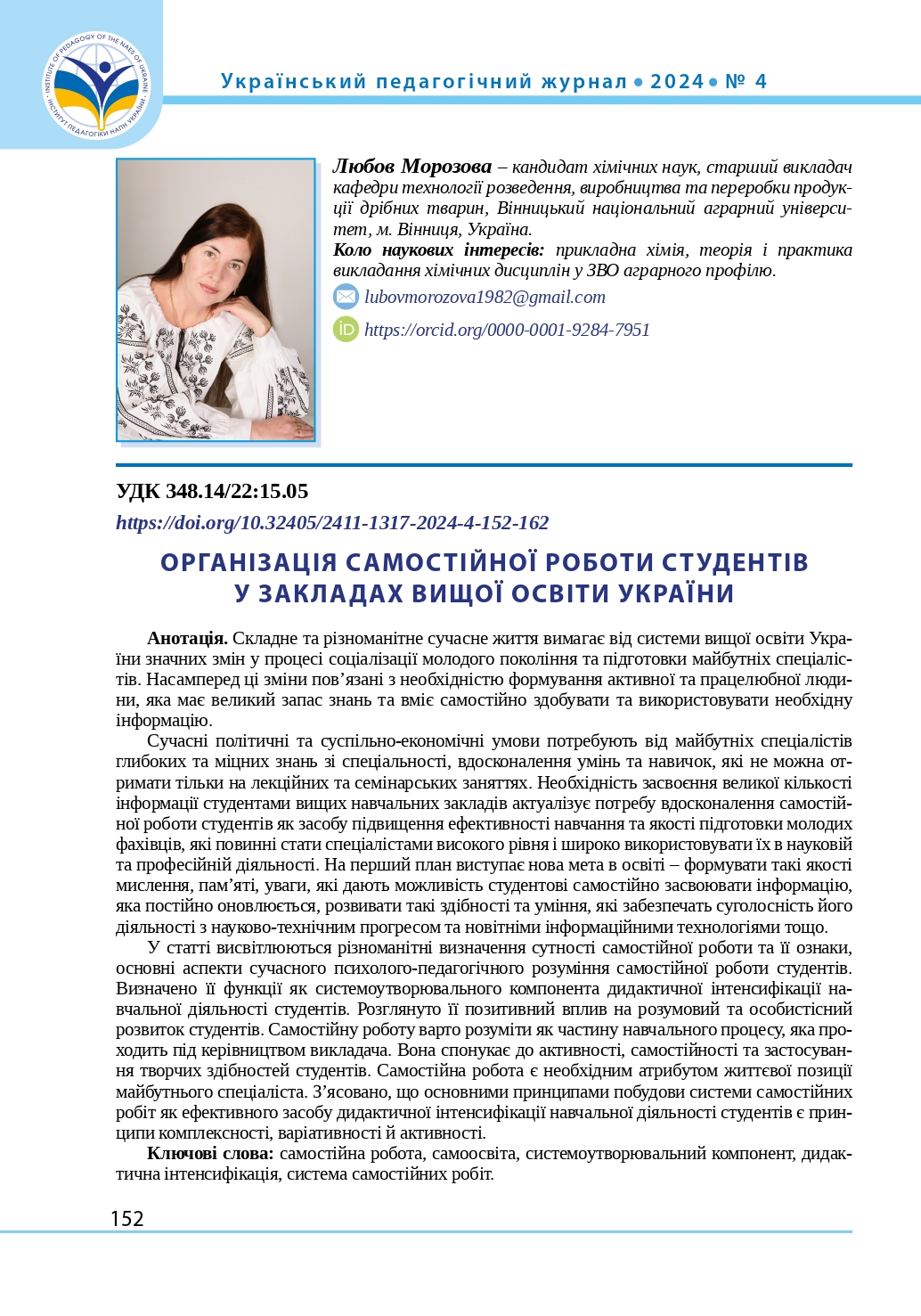Abstract
Complex and diverse modern life requires significant changes in the process of socialization of the younger generation and training of future specialists within the system of higher education of Ukraine. First of all, these changes are related to the need to form an active and hardworking person who has a large stock of knowledge and knows how to independently acquire and use the necessary information.
Modern political and socio-economic conditions require future specialists to have deep and solid knowledge in their field, as well as the development of abilities and skills that cannot be acquired solely through lectures and seminars. The need for for students in higher education institutions to assimilate large amount of information highlights the importance of improving independent work as a means of enhancing training efficiency and quality of training of young specialists who should become high-level specialists and apply their knowledge broadly in scientific and professional activities. A new goal in education comes to the fore – to form such qualities of thinking, memory, and attention that will allow the student to independently assimilate information that is constantly updated, to develop such abilities and skills that will ensure that he does not lag behind scientific and technical progress and information technologies etc.
The article highlights various definitions of the essence of independent work and its signs, the main aspects of modern psychological and pedagogical understanding of independent work of students. Its functions as a system-forming component of didactic intensification of students’ educational activities are determined. Its positive influence on the intellectual and personal development of students is considered. Independent work should be understood as part of the educational process, which takes place under the guidance of a teacher. It encourages students to be active, independent and use their creative abilities. Independent work is a necessary attribute of the life position of a future specialist. It was found that the key principles for building a system of independent works, as an effective means of didactic intensification of students’ educational activities, are the principles of complexity, variability and activity.
References
Алексюк, A., Аюрзанайн, А., Підкасистий, П., Козаков, В. (1993). Організація самостійної роботи студентів в умовах інтенсифікації навчання. Київ: ІСДО.
Антонюк, М. (1995). Психологічні особливості формування у студентів умінь і навичок самостійної роботи. Сучасні педагогічні технології у вищій школі: науково-методичний збірник. Київ: Вища школа.
Балицька, Т. (2007). Організація самостійної роботи студентів вищих навчальних закладів у світлі Болонського процесу. Освіта Донбасу, 1, 9‒15.
Головко, Л. (2002). Активізація самостійної роботи студента під час лекційних занять. Освіта і управління, 1, 147–150.
Демченко, О. (2006). Дидактична система організації самостійної роботи студентів. Рідна школа, 5, 68–70.
Жмура, І. (2010). Забезпечення якості самостійної роботи студента: реалістично-прагматичний погляд викладача. Технології навчання: науково-методичний збірник. Рівне: НУВГП. 59 – 66.
Занюк, С. (1997). Психологія мотивації та емоцій. Луцьк: ЛДУ.
Мащенко, Н. (2006). Основи педагогіки і психології вищої школи: курс лекцій (2-е видання, доповнене й перероблене). Кременчук.
Подоляк, Л., Юрченко, В. (2006). Психологія вищої школи: навчальний посібник для магістрантів і аспірантів. Київ: Філ-студія.
Семиченко, В. (2004). Психологія педагогічної діяльності: навчальний посібник для студентів вищих педагогічних навчальних закладів. Київ: Вища школа.
Слєпкань, З. (2005). Наукові засади педагогічного процесу у вищій школі. Київ: Вища школа.
Солдатенко, М. (2005). Самостійна пізнавальна діяльність студентів у контексті Болонського процесу. Рідна школа, 1, 49–51.
Стеченко, Д. (2005). Інновація та якість підготовки фахівців у вищій школі. Вища школа, 1, 43–45.
Aleksiuk, A., Aiurzanain, A., Pidkasystyi, P., Kozakov, V. (1993). Orhanizatsiia samostiinoi roboty studentiv v umovakh intensyfikatsii navchannia. Kyiv: ISDO. (in Ukrainian).
Antoniuk, M. (1995). Psykholohichni osoblyvosti formuvannia u studentiv umin i navychok samostiinoi roboty. Suchasni pedahohichni tekhnolohii u vyshchii shkoli: naukovo-metodychnyi zbirnyk. Kyiv: Vyshcha shkola. (in Ukrainian).
Balytska, T. (2007). Orhanizatsiia samostiinoi roboty studentiv vyshchykh navchalnykh zakladiv u svitli Bolonskoho protsesu. Osvita Donbasu, 1, 9‒15. (in Ukrainian).
Demchenko, O. (2006). Dydaktychna systema orhanizatsii samostiinoi roboty studentiv. Ridna shkola, 5, 68–70. (in Ukrainian).
Holovko, L. (2002). Aktyvizatsiia samostiinoi roboty studenta pid chas lektsiinykh zaniat. Osvita i upravlinnia, 1, 147–150. (in Ukrainian).
Mashchenko, N. (2006). Osnovy pedahohiky i psykholohii vyshchoi shkoly: kurs lektsii (2-e vydannia, dopovnene y pereroblene). Kremenchuk. (in Ukrainian).
Podoliak, L., Yurchenko, V. (2006). Psykholohiia vyshchoi shkoly: navchalnyi posibnyk dlia mahistrantiv i aspirantiv. Kyiv: Fil-studiia. (in Ukrainian).
Semychenko, V. (2004). Psykholohiia pedahohichnoi diialnosti: navchalnyi posibnyk dlia studentiv vyshchykh pedahohichnykh navchalnykh zakladiv. Kyiv: Vyshcha shkola. (in Ukrainian).
Sliepkan, Z. (2005). Naukovi zasady pedahohichnoho protsesu u vyshchii shkoli. Kyiv: Vyshcha shkola. (in Ukrainian).
Soldatenko, M. (2005). Samostiina piznavalna diialnist studentiv u konteksti Bolonskoho protsesu. Ridna shkola, 1, 49–51. (in Ukrainian).
Stechenko, D. (2005). Innovatsiia ta yakist pidhotovky fakhivtsiv u vyshchii shkoli. Vyshcha shkola, 1, 43–45. (in Ukrainian).
Zaniuk, S. (1997). Psykholohiia motyvatsii ta emotsii. Lutsk: LDU. (in Ukrainian).
Zhmura, I. (2010). Zabezpechennia yakosti samostiinoi roboty studenta: realistychno-prahmatychnyi pohliad vykladacha. Tekhnolohii navchannia: naukovo-metodychnyi zbirnyk. Rivne: NUVHP. 59 – 66. (in Ukrainian).

This work is licensed under a Creative Commons Attribution-NonCommercial-ShareAlike 4.0 International License.


